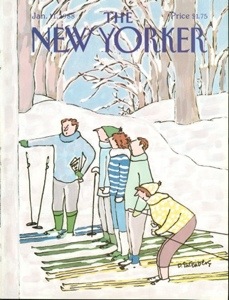Is everyone familiar with the principle of “Chekhov’s Gun?” If not, here’s a brief summary about it from Wikipedia:
Chekhov’s gun is a dramatic principle that requires every element in a narrative be necessary and irreplaceable, and that everything else be removed.
“Remove everything that has no relevance to the story. If you say in the first chapter that there is a rifle hanging on the wall, in the second or third chapter it absolutely must go off. If it’s not going to be fired, it shouldn’t be hanging there.” -Chekhov
Below: An armed Chekhov in a picture from uncyclopedia.com (looks pretty photoshopped to me… 🙂 )

This may be especially true of short stories, where – due to limited space – details are precious and must have relevance. Experienced readers begin to develop a skill of spotting Chekhov’s gun. Even I sometimes notice one hanging on the wall in a story – and sometimes more than one. This happened to me in reading Alice Munro’s great story “Axis.”
This was my second Munro story in two weeks for my Deal Me In short story reading challenge. Perhaps the hand of fate noticed I wasn’t that taken with the other story of hers that I read (“Menesetung”) and pointed me to this one right away so I might form a better impression of Munro. If so, mission accomplished! Originally published in the New Yorker magazine, I own the story as part of my “The Best American Short Stories 2012” anthology. It’s the story of two college friends, Avie and Grace, and how their lives didn’t quite turn out as expected.

The bulk of the story takes place “fifty years ago” and Avie and Grace are students at “the university.” Each is pursuing a field of study, but in reality their unspoken purpose is to find their future husbands… The girls have two men in their lives, Avie has Hugo, and Grace has Royce, a former soldier.
The first of Chekhov’s guns came in the form of a dream that Avie had:
“In the dream, she was married to a Hugo, who really was hanging around as if he hoped to marry her, and she had a baby, who cried day and night. It howled, in fact, till she thought she would go crazy. At last she picked up this baby … and took her down to some dark basement room and shut her in there, where the thick walls ensured that she wouldn’t be heard. Then she went away and forgot about her. And it turned out that she had another girl baby anyway, one who was easy and delightful and grew up without any problems.
But one day this grown daughter spoke to her mother about her sister hidden in the basement. It turned out that she had known about her all along – the poor warped and discard one had told her everything – and there was nothing to be done now. ‘Nothing to be done,’ this lovely, kind girl said. The abandoned daughter knew no way of life but the one she had and, anyway, she did not cry anymore; she was used to it.”
When she tells Grace about the dream, her friend’s reaction is predictable. She thinks it’s an awful dream and asks Avie if she hates children. “Not unreasonably,” Avie said. That’s an interesting answer, isn’t it? Anyway, the shadow of this dream (which is related near the start of the tale) hung over the story in my mind as I was reading, and unlike the other Chekhov’s Gun in the story, it is never explicitly resolved. I did finish reading with some pretty strong ideas about its relevance, though.
The other gun of Chekhov’s was more traditional. Early in the story, Royce is traveling by bus to see Grace at her family’s farm in the country. Unlike Avie, Grace is rather straight-laced and hasn’t allowed too much “familiarity” with Royce yet. On the trip, he is harboring hopes of “getting Grace alone” at some point during the visit (I should mention that Grace hopes this too). Along the way, though, the bus passes Avie’s home town and from the bus window, Royce espies Grace’s friend:
“She was standing on the sidewalk of the Main Street, talking to somebody. She was full of animation, whipping her hair back when the wind blew it in her face… She looked carefree, and in immensely good spirits – prettier, more vivid, than he ever remembered seeing her.”
In short, she was everything Grace was not (at least to this point in their relationship). Royce considers hopping off the bus and pursuing Avie on a whim, but common sense prevails and he continues on his journey. Of course, I immediately thought, “These two are getting together,” and began “waiting out” the story until this would happen. As I approached the end of the story, though, I began to get concerned. “There’s only three pages left! Where’s Avie?!”, etc. Well ***Spoiler Alert*** they do meet up again, but in a more poignant and bittersweet way than I would have imagined.
This story first appeared in the New Yorker magazine in 2011

I really enjoyed the story, and also speculating about the meaning of the title, “Axis,” a word which means something that is revolved around. Is the Axis Royce’s visit to the family farm and its result? Is the Axis Royce’s change in career choice after seeing (and noticing for the first time) the “Niagara Escarpment” – a rock formation – which leads him to become a geologist. Is the Axis Avie’s horrible dream, which cryptically might explain everything (or maybe nothing) about the friends? This will not be my last reading of Alice Munro, that much is certain.
What about you? What short stories have you read recently, and who are some of your favorite short story authors?
(Below: part of the “Niagara Escarpment”)

Oops! Sorry. Wrong Chekhov!

39.665453
-86.076979

















